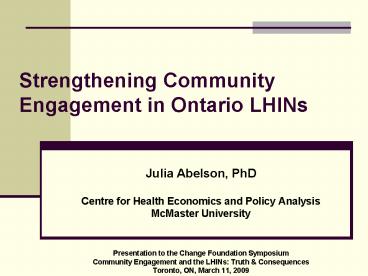Strengthening Community Engagement in Ontario LHINs - PowerPoint PPT Presentation
1 / 20
Title:
Strengthening Community Engagement in Ontario LHINs
Description:
Strengthening Community Engagement in Ontario LHINs. Julia Abelson, PhD ... 'Point Map' Generated from Sort Data of LHIN Staff. Sample Cluster Solution ... – PowerPoint PPT presentation
Number of Views:52
Avg rating:3.0/5.0
Title: Strengthening Community Engagement in Ontario LHINs
1
Strengthening Community Engagement in Ontario
LHINs
- Julia Abelson, PhD
- Centre for Health Economics and Policy Analysis
- McMaster University
- Presentation to the Change Foundation Symposium
- Community Engagement and the LHINs Truth
Consequences - Toronto, ON, March 11, 2009
2
From Consultation to Engagement
- Public consultation
- One-way, top-down, one-way information flow
- Past experiences have produced cynicism and
distrust - Citizen/public/community engagement
- Two-way obligations, information sharing,
trusting relationships - Linked to deliberation and reason-based decisions
- Effort to correct past failures, re-establish
trust between citizens and government officials
3
(No Transcript)
4
Role of LHINs (Part II, sec.5)
- To plan, fund and integrate the local health
system to achieve the following - Promote integration
- Plan and recommend allocation of resources in
response to health services needs - Engage community in planning and priority setting
through formal channels of community input and
consultation - Establish processes for responding to concerns
raised about health services - Evaluate, monitor, report on and be accountable
to Minister for local health system performance
5
Community Engagement and LHINs (Part III, sec. 16)
- LHINs shall engage the community of diverse
persons and entities involved with the health
system on an ongoing basis, including about the
integrated service plan and while setting
priorities (Part III, 16.1) - Community definition (Part III, 16.2a-c)
- Patients and other individuals
- Health service providers
- Employees involved in the local health system
6
Methods of Engagement (Part III, 16.3.)
- The methods for carrying out community
engagement may include holding community meetings
or focus group meetings or establishing advisory
committees - Specific requirements for engaging with
- Aboriginal and First Nations
- French Language health planning groups in each
LHIN - Health professionals advisory committee
7
Public/ Stakeholders
Government
LHINS
8
LHINS
Government
Public/Stakeholders
9
Supports for Community Engagement
- Choose carefully among CE goals and audiences for
CE outputs - Develop concepts of effective CE and measure it
as rigorously as you can - Determine your evaluation priorities
- Build and sustain CE capacity
10
The Goals of Community Engagement
- Instrumental to inform (and potentially improve)
decisions that are more reflective of
patients/public needs and preferences - instrumental objective of regionalization
- Developmental to inform, educate and build
citizen capacity - Procedural/democratic to legitimize decision
making and to fulfill democratic accountability
requirements
11
Define effective CE and measure its achievement
- Convergence among academics, decision makers and
the public about effective or successful CE - Contextualize generic definitions
- Standardized approaches to evaluation across and
within LHINs
12
Example LHIN Common Assessment Tool Project
- Common LHIN-tailored evaluation framework and
questionnaire developed using concept mapping
methodology - Determine how effective CE is understood across
the LHINs - Steps
- Brainstorming statements about effective CE
- Sorting and rating to determine relationships and
importance - Mapping to visually represent statements about
effective CE and their relationships
13
Point Map Generated from Sort Data of LHIN Staff
14
Sample Cluster Solution
15
Sample Cluster Solution
16
Determine Evaluation Priorities (and link these
to CE goals)
- Process
- Clear communication of objectives, format and how
input will be used - Outcomes (How) does effective CE
- Health system knowledge
- Capacity for future public involvement
- Improved trust of fellow citizens, LHINs and
health system - Shape policy, decision making and political
process - Contribute to improved integration?
- Context also matters
- exerts fostering and inhibiting influences that
contribute to more (and less) effective CE
17
The Context of Public Participation (Abelson et
al. 2007)
18
Building and Sustaining Capacity for Effective CE
- How do we facilitate effective CE in our
organizations, communities and health systems? - What capacity is required to carry this out?
- How is the practice of effective CE diffused
within health systems? - Can organizations learn it?
- What type of leadership required?
- Stay tuned
- Evaluating the Impacts of Public Engagement A
Research-Practice Collaboration (Abelson et al.,
CIHR, 2008)
19
LHINS
Government
Public/Stakeholders
20
Public/ Stakeholders
Government
LHINS































